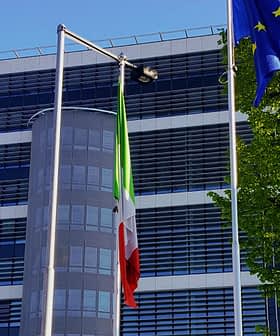Europe, U.S. Agree to Freeze Tariffs for Four Months
The United States and European Union have agreed to suspend retaliatory tariffs in the Airbus-Boeing dispute, including those on Spanish olive oil and table olives, for an initial period of four months, providing relief for the struggling Spanish olive sector. The decision is seen as a positive step for economic cooperation between the two regions and is expected to help Spanish producers regain market share and increase olive oil prices in the U.S. market.
The United States and European Union have agreed to suspend the $11.5 billion (€9.65 billion) worth of retaliatory tariffs reciprocally imposed during the ongoing 17-year dispute over subsidies to aircraft manufacturers Boeing and Airbus.
The 25-percent tariff imposed by the United States on some Spanish olive oils and Spanish and French green table olives will be dropped after U.S. President Joe Biden spoke with European Commissioner Ursula von der Leyen on Friday.
A new scenario opens up for us, at least in the next four months, where we will work to increase exports with the idea of recovering lost ground.
“As a symbol of this fresh start, President Biden and I agreed to suspend all our tariffs imposed in the context of the Airbus-Boeing disputes, both on aircraft and non-aircraft products, for an initial period of four months,” von der Leyen said.
“We both committed to focus on resolving our aircraft disputes, based on the work of our respective trade representatives,” she added. “This is excellent news for businesses and industries on both sides of the Atlantic and a very positive signal for our economic cooperation in the years to come.”
The news has been eagerly welcomed throughout the Spanish olive oil sector, which recently reported an 80-percent decrease in bottled olive oil sales to the U.S.
A previous report from the Spanish Association of Table Olive Exporters and Producers (Asemesa) found that table olive exports from Spain to the U.S. had fallen by 30 percent in the first half of 2020, compared with 2019.
Cristóbal Cano, the head of the table olive and olive oil sector at the Union of Small Farmers and Ranchers (UPA) and secretary general of UPA Jaén, hailed the decision as great news for the industry and said the decision could even increase olive oil prices.
“This deal represents… one more step towards the favorable evolution of prices at the origin of the oil, which are growing throughout the season,” Cano said in a statement. “The elimination of tariffs supposes, in our opinion, removing from the equation a justification that some used to maintain an interesting situation of low prices at origin.”
See Also:Trade NewsWhile the news provides Spanish producers and exporters plenty of reasons to celebrate, Cano acknowledged that a lot of hard work would be required for them to recapture some of the market share that has been lost in the past 16 months.
“The tariffs that we have suffered from [former President Donald] Trump have been totally unfair for the olive oil and table olive sector,” Cano said. “We have been immersed in a trade war with which we had nothing to do and yet we have paid for the broken dishes.”
“Now, a new scenario opens up for us, at least in the next four months, where we will work to increase exports with the idea ofrecovering lost ground,” he added. “Bottled olive oil and table olives will once again occupy their rightful place in stores and North American kitchens.”
The United States remains the third-largest market for olive oil in the world. Data from the International Olive Council shows that olive oil consumption is continuing to trend upward in the country. At the same time, anecdotal evidence suggests that the extra virgin category is picking up steam.
Cano said that the cessation of tariffs comes at just the right moment for Spanish producers to refocus their efforts on capturing a larger share of the lucrative market.
“Our sector is again given the possibility of recovering part of the lost path based on exports of an extra virgin olive oil of the highest quality and value,” he said. “Because we must remember that the consumer, more and more, is willing to pay the differentiation and the excellence.”









